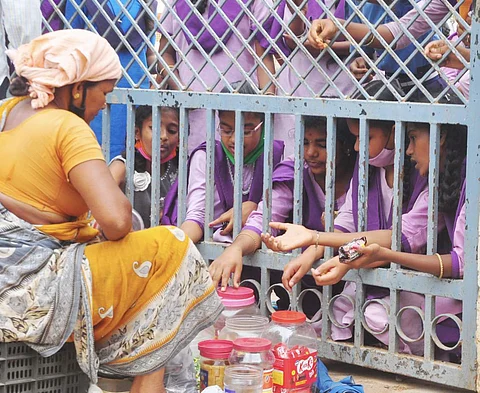

India is home to the largest school-going population in the world, with over 260 million children enrolled in schools. However, the country also has a growing problem of childhood obesity. A recent study found that over 15 per cent of Indian children are overweight or obese. This is a significant increase from just a decade ago, when the rate of childhood obesity was less than 5 per cent.
One of the factors contributing to childhood obesity in India is the easy availability of unhealthy snacks. These snacks are often high in calories, unhealthy fats, sugar, and salt. They are also often low in nutrients.
In recent years, there has been a growing movement to ban such snacks in schools. Proponents of the ban argue that it would help to improve student health and reduce the risk of childhood obesity.
What are the potential benefits of banning high-calorie snacks, the kinds sold in newspapers in stalls or shacks?
Improved student health: Banning them would reduce students' access to these unhealthy foods and help to improve their overall health
Reduced obesity rates: Obesity is a major public health problem in India, and children are particularly at risk. Banning unhealthy snacks in schools would help to reduce the number of obese children and adolescents
Improved academic performance: Studies have shown that students who eat healthy diets tend to perform better in school. Banning unhealthy snacks in schools would help to improve students' academic performance
Potential challenges of banning these snacks:
Increased demand for unhealthy snacks outside of school: If snacks are banned in schools, students may be more likely to purchase unhealthy snacks from other sources, such as convenience stores and street vendors.
Difficulty enforcing the ban: It may be difficult to enforce a ban on snacks. Students may still be able to bring unhealthy snacks from home or purchase them from vendors outside of school grounds.
There are a number of ways to address the potential challenges of banning snacks sold in newspapers in schools:
Work with parents and communities to educate students about the importance of healthy eating and to provide them with access to healthy snacks: This could be done by providing healthy snacks in the school canteen or by encouraging students to bring healthy snacks from home
Develop strategies to enforce the ban: Schools could develop strategies to enforce the ban on snacks sold in newspapers.
Overall, the pros outweigh the cons. However, it is important to carefully consider the potential challenges and develop strategies to address them.
